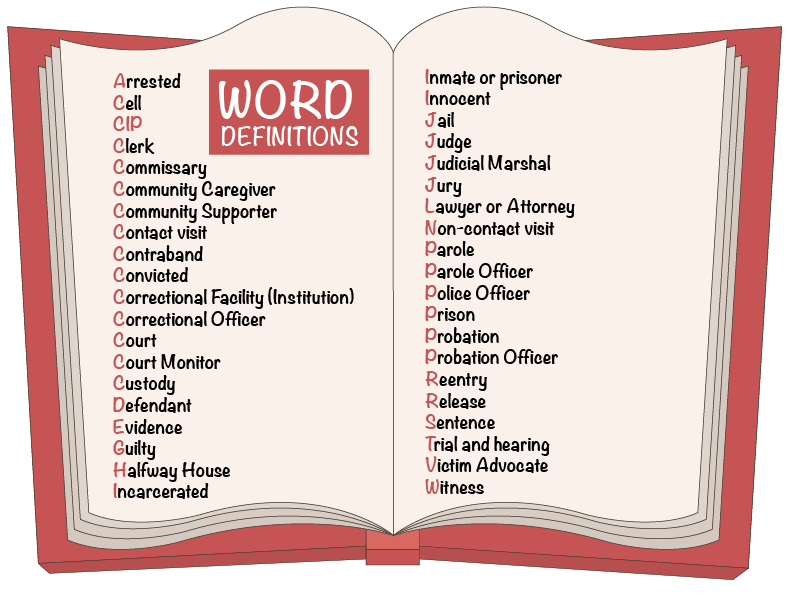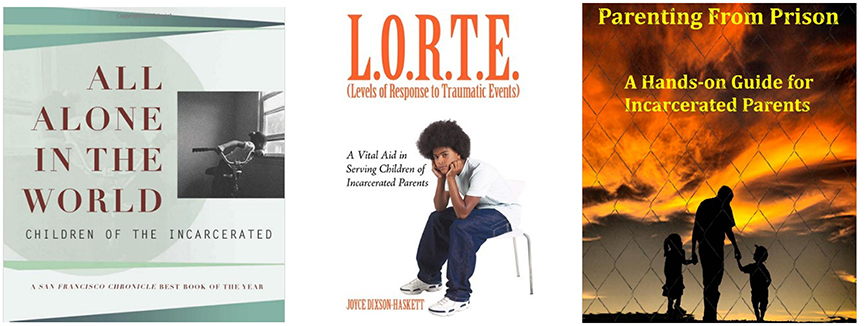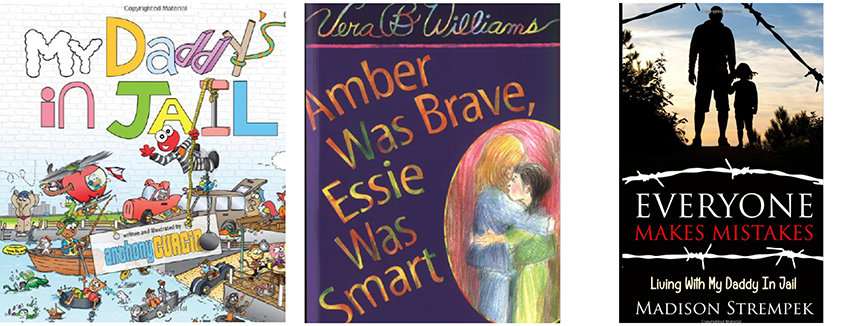
Definitions
Click on the words inside the Dictionary to learn their definitions!

Arrested
A person is stopped by the police, asked questions, and may have to stay at a police department, jail or prison. If the arrested person does have to go to a police department, jail or prison, the stay can be very short or very long. Ask an adult you trust if they know how long the arrested person might have to stay.
Cell
A small room in a prison where a person in prison lives. One or several people may live in that same room.
CIP
This stands for Children with Incarcerated Parents.
Clerk
The Clerk helps the judge to make sure that court processes are followed.
Commissary
Where people can buy food, snacks, toiletries, and other items for sale
Community Caregiver
This is a person who gives care, guidance and support to children with incarcerated parents or loved ones. A Community Caregiver usually lives with the children they provide care for. Some examples of a Community Caregiver are parent, step-parent, guardian, girlfriend or boyfriend of a parent, grandparent, foster parent, or older sibling.
Community Supporter
This is a person who helps children with incarcerated parents or loved ones, and their families but does not live with the children. Some examples of Community Supporters are teachers, neighbors, therapists, counselors, coaches, mentors, social workers, doctors, and school nurses.
Contact Visit
In most prisons in Connecticut, during a contact visit visitors are allowed to briefly touch (hug, shake hands and kiss) the person they are visiting at the beginning and again at the end of their visit. During the visit, the visitors and incarcerated person are allowed to sit across from each other at a table and talk. They are not, however, allowed to touch while sitting at the table during the visit.
Contraband
There are a lot of things that are not allowed inside a prison, like cell phones, toys and cameras. Anything not allowed inside of a prison is called “contraband”. When you go to prison to visit someone, you might be able to bring these items into the waiting area, but not inside the visiting room. Staff at the prison will check to make sure you and others visiting do not accidentally bring something into the visiting room that the prison does not allow.
Convicted
When the court decides that the person arrested for breaking a law or rule did break the law, they have been found “guilty” and are “convicted” of breaking the law.
Correctional facility, or correctional institution
In Connecticut, a correctional facility (sometimes called correctional institution or prison) is a place where an arrested person, and people convicted of a crime, stay. To find out how long your loved one might stay at a correctional facility, correctional institution or prison, ask an adult that you trust.
Correctional Officer
A person that supervises the people staying at a jail, prison or correctional facility. Correctional Officers, sometimes called COs, are also the people that supervise visits at jails, prisons and correctional facilities.
Court
Court is where a judge listens to your family member and other people during a trial or hearing. The judge tries to find out what happened and make a fair decision about what will happen next.
Court Monitor
The Court Monitor sits in the courtroom to record what people say during hearings and trials.
Custody
When police temporarily keep an arrested person at the police department, jail or prison.
Defendant
Is the person who the police say has committed the offense or broken the rule.
Evidence
Information that is presented in Court to help the judge or jury determine whether they believe that the arrested person did break the law, or disobey a rule.
Guilty
When it is decided by the court that the person arrested for breaking a law or rule did break the law, they have been found to be “guilty”.
Halfway house
When some people are released from prison, they move into a halfway house. A halfway house is a home that is away from the prison and in a community. Living in a halfway house can help people that are leaving prison get used to life outside of prison before they return home. Once it is determined that the person living at the halfway house is ready to return home, they are released and allowed to move out.
Incarcerated
When a person has to live in a jail, prison or correctional facility they are “incarcerated”.
Inmate or prisoner
Both words refer to a person that is living at a jail, prison or correctional facility.
Innocent
When it is decided that the person arrested for breaking a law or rule did not break the law, they have been found to be “innocent”.
Jail
The place where an arrested person lives while they wait for their trial if in another state. In Connecticut, there are no jails. A person that has been arrested in Connecticut will stay in prison while they wait for their trial.
Judge
A judge is the person that is in charge of the court and oversees the hearings and trials that happen at court. For some cases, the judge will also decide if the defendant is guilty of committing the offense (or breaking the rule). In other cases, a jury (a group of people) will decide if the defendant is guilty of committing the offense.
Judicial Marshal (or just “Marshal”)
A Judicial Marshal works at the court to make sure that everyone follows the rules of the court while they are there. Judicial Marshals will make sure that no one brings anything into court that is not allowed and they help people that have been arrested and are staying at a prison or jail get to-and-from court safely.
Jury
A jury is a group of adults, called Jurors, who are asked to come to court to decide whether the evidence presented during a trial demonstrates that the arrested person is guilty or innocent. Some cases don’t have Jurys. In those cases, the Judge will decide whether the evidence presented during a trial demonstrates that the arrested person is guilty or innocent.
Lawyer or Attorney
A person who has studied the law and gives advice to clients and assists them in court.
Non-contact visit
A visit in a jail or prison when visitors are not allowed to touch or hug the person that they are visiting. Usually, the visitor and the person they are visiting sit across from each other, separated by glass or a window. They can see each other through the window but not touch each other. Each side of the window has a telephone so the visitor and the person they are visiting can talk to each other on the phone.
Parole
When a person is released from prison but still has to follow some rules and check in with a Parole Officer, they are “on parole”, or “have been paroled”.
Parole Officer
A Parole Officer tries to make sure that the person on parole is following the rules that they have been given and is doing well while not in prison.
Police Officer
A person who works for a police department to make sure that everyone follows the laws, or rules, in that area. If they believe a law or rule has been broken, they ask people questions and look for proof that the law was broken to see if a person broke the law and needs to serve a consequence for it. Sometimes, police officers arrest people that they believe broke a law or rule so that the person can serve their consequence.
Prison
In Connecticut, prison is a place where arrested and convicted people stay if going to prison is part of their consequence for breaking the law, or rule.
Probation
When an arrested person is “on probation”, they are not in prison but do check in with a Probation Officer. Sometimes people are put on probation after an arrest so they don’t have to go to prison. Other times they are put on probation after being released from jail or prison.
Probation Officer
A Probation Officer tries to make sure that the person on probation is doing well and follows the rules given to them.
Reentry
When formerly incarcerated people return to life outside of jail, prison, or a correctional facility.
Release
When someone that has been staying at jail, prison, or a correctional facility is allowed to leave, they are “released”.
Sentence
When it is decided that an arrested person is guilty of breaking a law (they have been convicted), a sentence, or consequence, is given to them. This sentence may include living in a prison for a certain amount of time, paying some money, or having to follow additional rules that a Probation Officer will try to make sure are followed.
Trial and Hearing
These take place at court. They are kind of like meetings where a judge, lawyers, and maybe a jury talk about the arrested person’s situation to decide if they believe the arrested person is innocent or guilty of breaking the law. If it is decided that the arrested person is guilty, than they will be convicted. If it is decided that the arrested person is innocent, than they will be allowed to go home.
Victim Advocate
This is a person who the judge has agreed can support a witness or victim while they are in court.
Witness
Witnesses are people who have knowledge that might help the judge or jury decide if the defendant has broken a law, or rule.
Click on the buttons to play fun educational games!
All subjects:

Math:

English/Language Arts:

Science:

Coloring Book:

Books
Teens

| Title | Author | Age | Description | Purchase |
| Jakeman | Deborah Ellis | adolescents | "Jake and his sister Shoshona have been under foster care since their single mother was arrested for possession and trafficking three years before. Both have found their own ways to cope: Shoshona has become a bossy mother figure; Jake, who is a budding comic book artist, has created an alter ego named Jakeman." |
Click here to purchase this book. |
| Title | Author | Age | Description | Purchase |
| Chasing Forgiveness | Neal Shusterman | 12+ years | "Preston Scott was only twelve years old when his father killed his mother...Fast forward: Preston is now fourteen. His father has just been released from jail and is moving near his grandparents’ house, where Preston and his younger brother Tyler have been living." |
Click here to purchase this book. |
| Title | Author | Age | Description | Purchase |
| Pieces of Why | K.L. Going | 10+ years | "When a shooting happens in [Tia's] neighborhood and she learns the truth about the crime that sent her father to prison years ago, Tia finds she can't sing anymore. The loss prompts her to start asking the people in her community hard questions--questions everyone has always been too afraid to ask." |
Click here to purchase this book. |
| Title | Author | Age | Description | Purchase |
| An Inmate's Daughter | Jan Walker | Grade 5 to 8 | "On the first day of summer vacation between seventh and eighth grade, Jenna MacDonald does the dumbest thing ever. She jumps from the McNeil Island boat dock into the water to save a little girl from drowning. McNeil Island is a prison in the middle of Puget Sound. It’s where Jenna’s dad lives, and she is there with her mother, brother, and grandparents for a visit." |
Click here to purchase this book. |

| Title | Author | Age | Description | Purchase |
| What Will Happen to Me | Howard Zehr | Grade 7+ | "What is life like for a child who has a parent in prison? This book brings together photographic portraits of 30 children whose parents are incarcerated, along with their thoughts and reflections, in their own words." |
Click here to purchase this book. |
| Title | Author | Age | Description | Purchase |
| Secret Saturdays | Torrey Maldonado | 12+ years | "Sean is Justin's best friend - or at least Justin thought he was. But lately Sean has been acting differently...When Justin finally discovers that Sean's been secretly going to visit his father in prison and is dealing with the shame of that, Justin wants to do something to help before his friend spirals further out of control." |
Click here to purchase this book. |
| Title | Author | Age | Description | Purchase |
| Wish You Were Here: Teens Write about Parents in Prison | Autumn Spanne & Nora McCarthy & Laura Longhine | 13 to 17 years | "Many young people in foster care have a parent in prison. The teens in this booklet describe the emotional impact of that experience, which can help readers open up about their own reactions and emotions." |
Click here to purchase this book. |
| Title | Author | Age | Description | Purchase |
| Romar Jones Takes a Hike | Jan Walker | 13+ years | "When his 9th grade language arts teacher tells him to pay attention to the poetry assignment or take a hike, Romar opts for the hike, walks out of Roseburg Oregon High School and embarks on a journey to find his mother. He figures that shouldn't be too hard. She's in prison in Washington." |
Click here to purchase this book. |
Others

| Title | Author | Audience | Description | Purchase |
| All Alone in the World: Children of the Incarcerated | Neil Bernstein | For lawmakers | An award-winning journalist's "heart wrenching" (The San Antonio Observer) look at children with parents in prison—a Newsweek "book of the week" and an East Bay Express bestseller. In this "moving condemnation of the U.S. penal system and its effect on families" (Parents' Press), award-winning journalist Nell Bernstein takes an intimate look at parents and children—over two million of them—torn apart by our current incarceration policy. Described as "meticulously reported and sensitively written" by Salon, the book is "brimming with compelling case studies...and recommendations for change" (Orlando Sentinel); Our Weekly Los Angeles calls it "a must-read for lawmakers as well as for lawbreakers." |
Click here to purchase this book. |
| Author | Audience | Description | Purchase |
| Joyce Dixson-Haskett | For Family and professionals | "Joyce Dixson killed a man. As she stood in the courtroom and listened to the Judge issue the verdict, bewildered, she thought: "How could my life have come to this?" The next thing she thought was: "What is going to happen to my children?" Her children were just two children in millions, who are still living with parents in prison. There wasn't much information available on this population when she went to prison. However, Levels of Response to Traumatic Events is a tool that will equip family, lay people and professionals alike in effectively helping and working with children of incarcerated parents." |
Click here to purchase this book. |
| Title | Author | Audience | Description | Purchase |
| Parenting From Prison | Mr. James M Birney | For ncarcerated parent | "Parenting From Prison was written for the incarcerated parent who is seeking to establish or grow a quality relationship with their child. Parenting from Prison is a unique experience that requires a parent to adapt their traditional parenting roles and responsibilities, to the prison environment and the limitations that come with it." |
Click here to purchase this book. |
Email us at ctcip@uconn.edu if you know of any books related to parental incarceration that we should add to our list!



